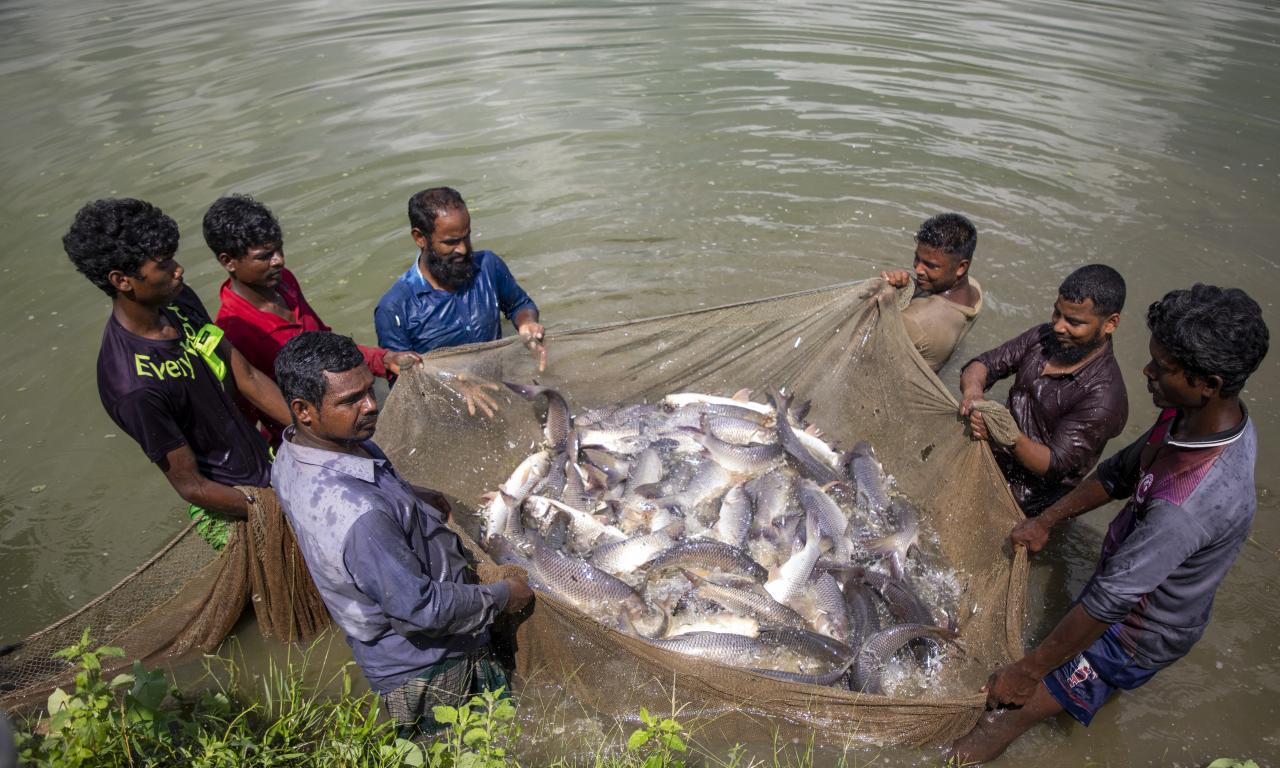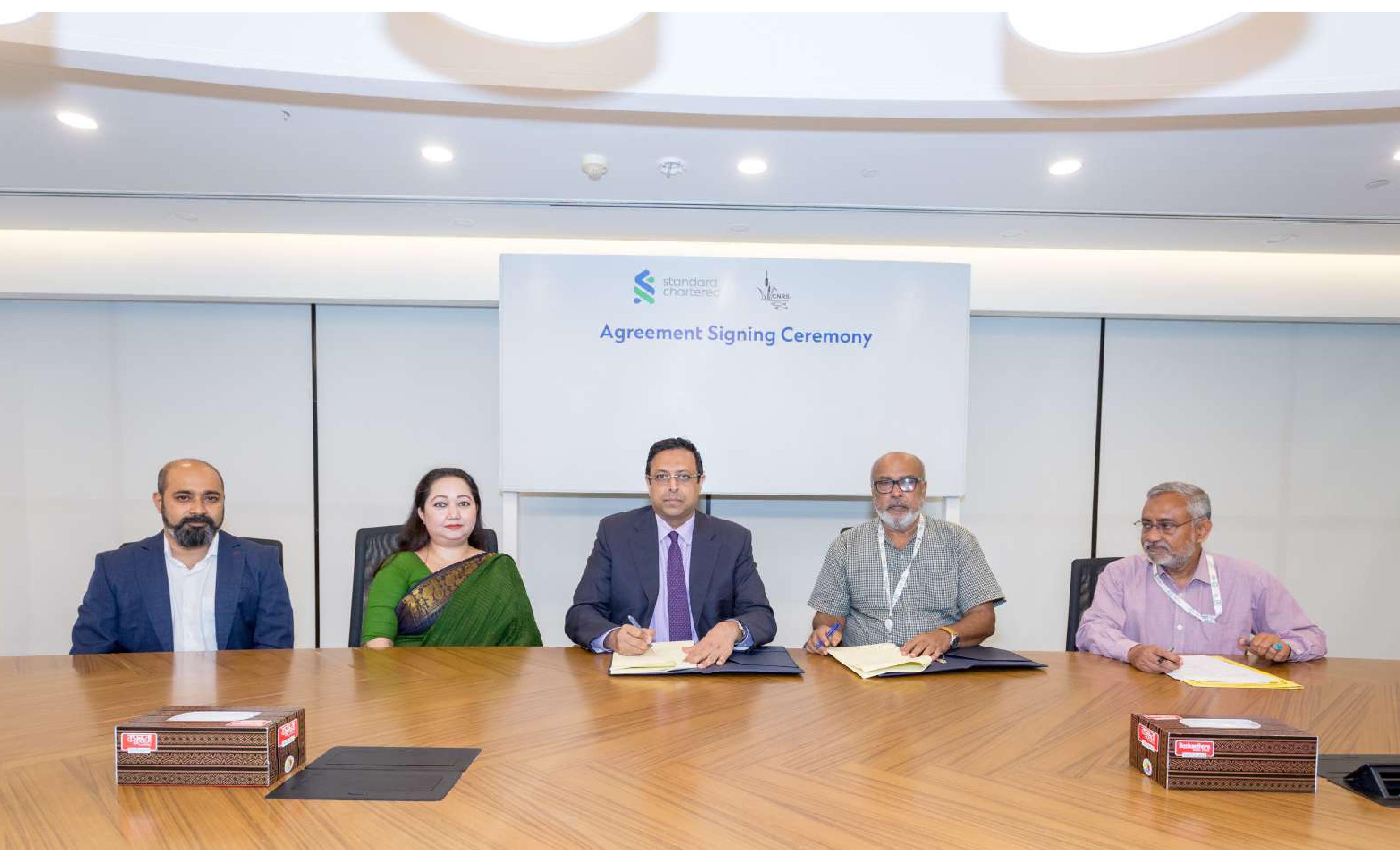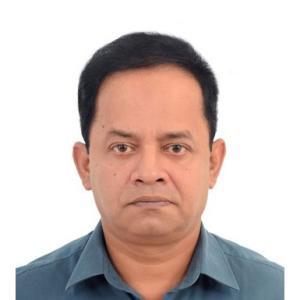
- Through a landmark Corporate Social Responsibility (CSR) initiative, Standard Chartered Bangladesh (SCB) and the Center for Natural Resource Studies (CNRS) join forces to improve the availability of high-quality fish seeds.
- The initial impact is set to be substantial, benefiting 20,000 farmers in southern Bangladesh by enabling them to yield an estimated 600 tons of harvestable Generation-3 (G3) Rohu annually.
The fisheries and aquaculture sectors are vital contributors to the Bangladeshi economy, providing jobs and significant export earnings. According to the Department of Fisheries (DoF), the aquaculture sector contributes to 57% of the 4.7 million metric tons of fish production. However, the limited availability of quality fish seed poses a challenge, leading to lower productivity and disease vulnerability. So, ensuring access to quality fish seed is crucial as it directly impacts productivity.
Standard Chartered Bangladesh (SCB), has collaborated with the Center for Natural Resource Studies (CNRS), a national non-governmental organization in Bangladesh, to foster sustainable, equitable, and climate-resilient aquaculture processes in Bangladesh. Through this grant provided by SCB as a part of their corporate social responsibility (CRS) initiative, CNRS aims to enhance the availability and accessibility of high-quality fish seeds for aquaculture farmers in the southern region of Bangladesh, particularly in the climate-stressed Lower Ganges Delta. To achieve this goal, CNRS has partnered with WorldFish and the Asian Mega Deltas (AMD) initiative of One CGIAR to ensure the availability of improved fish strains, specifically the Generation-3 rohu from WorldFish's Carp Genetic Program (CGIP). This strain possesses desirable traits such as rapid growth benefiting aquaculture farmers in the southern region of Bangladesh.
With the technical support from WorldFish, CNRS will concentrate on establishing a robust fish seed distribution network, encompassing nurseries and fish seed traders. This network is vital for ensuring farmers' access to high-quality fish seeds, promoting aquaculture growth, and enhancing regional productivity.

|
The Significance of Generation-3 (G3) Rohu in the Aquaculture of Bangladesh
Rohu is a culturally and economically significant carp species in Bangladesh. The Generation-3 (G3) Rohu, a genetically improved high-yield variant, is the outcome of a decade-long research and development effort in Bangladesh led by WorldFish's Carp Genetic Improvement Program (CGIP) and its collaborators. The Rohu Genetic Improvement Program, initiated in 2012, involved spawn collection from the Halda, Padma, and Jamuna rivers. By 2020-2021, after three generations of meticulous selection, the program successfully developed the third-generation Rohu strain. In a field trial conducted in the Jashore, Natore and Rajshahi regions in 2021-2022, the WorldFish G3 Rohu exhibited a remarkable 37% higher growth rate compared to a conventional Rohu strain, allowing it to reach harvestable size in a shorter period. This characteristic enhances its economic value for farmers.
Developing a Robust Seed Distribution Network for Aquaculture Value-Chain Actors
Providing quality fish seed to farmers is a major purpose of this CSR initiative. Through this engagement with WorldFish, CNRS will benefit from AMD's expertise and gain skills in improved and climate-smart aquaculture practices. This will enhance CNRS's capacity to effectively utilize the fund to establish a well-structured and efficient distribution network of nurserers and farmers to ensure farmers' timely access to quality fish seed. Furthermore, WorldFish will provide technical support to CNRS in strengthening connections between producers, market information, support services, and retailers. By facilitating these essential linkages and equipping value chain actors with the necessary skills and knowledge on better management practices, this collaboration will ensure a seamless flow of information and resources, benefiting everyone involved in the aquaculture sector.
Moreover, WorldFish's AMD staff in Bangladesh will provide technical assistance for G3 rohu dissemination and the implementation of SIS in pond systems, including the selection of nutritious crops on the pond dike. The knowledge products developed by WorldFish will be distributed to stakeholders during the capacity development events.
The initial impact is set to be substantial, directly reaching out to 2,000 farmers from southern Bangladesh receiving 30 tons of G3 Rohu fingerlings. This distribution will enable 20,000 farmers (direct and indirect reach) to produce approximately 600 tons of harvestable G3 Rohu annually. Beyond the numbers, this CSR initiative will contribute significantly to the region's food and nutritional security, improve economic conditions for farmers, and promote sustainable and integrated aquaculture and agriculture practices.
An Alternative Financial Model for Scaling and Ensuring Sustainability of Research Innovations
The lack of funding for scaling up research innovations is a common challenge faced by many organizations and initiatives. This financial constraint often hampers the ability to expand innovations, hindering their full potential impact. Corporate Social Responsibility (CSR) funding can be pivotal in addressing the lack of funds for scaling up research innovations.
Here, by integrating financial support from the CSR initiative of Standard Chartered Bangladesh (SCB), technical expertise from research organizations like WorldFish, and the grassroots implementation capabilities of local non-governmental organizations such as CNRS, a synergistic approach is created. The grant provided to CNRS is sourced from the Corporate Social Responsibility (CSR) fund of SCB, with 93% of the funds allocated for beneficiaries and field-level activities. The AMD team of WorldFish assisted CNRS in drafting the proposal, ensuring its coverage of cultivation technology and scaling issues. The AMD team of WorldFish has committed to providing essential manpower and logistical support in 2024 as well, contingent upon the available funds of AMD.
This collaborative effort presents a promising alternative financial model for scaling and sustaining research innovations. This model not only ensures the successful scaling and implementation of research innovations but also promotes long-term sustainability by addressing the specific needs of local communities. In the signing ceremony, Standard Chartered Bangladesh's CEO, Mr. Naser Ezaz Bijoy, underscores the urgency of supporting the sustainability and resilience of aquaculture systems in the face of climate change. He also emphasized that through this CSR initiative, the organization not only intends to empower farmers but also ensures food and nutrition security for the nation.
Through strategic partnerships and the alignment of resources and expertise, such initiatives can serve as a blueprint for future collaborations, driving innovation and sustainable development in aquaculture sectors.

